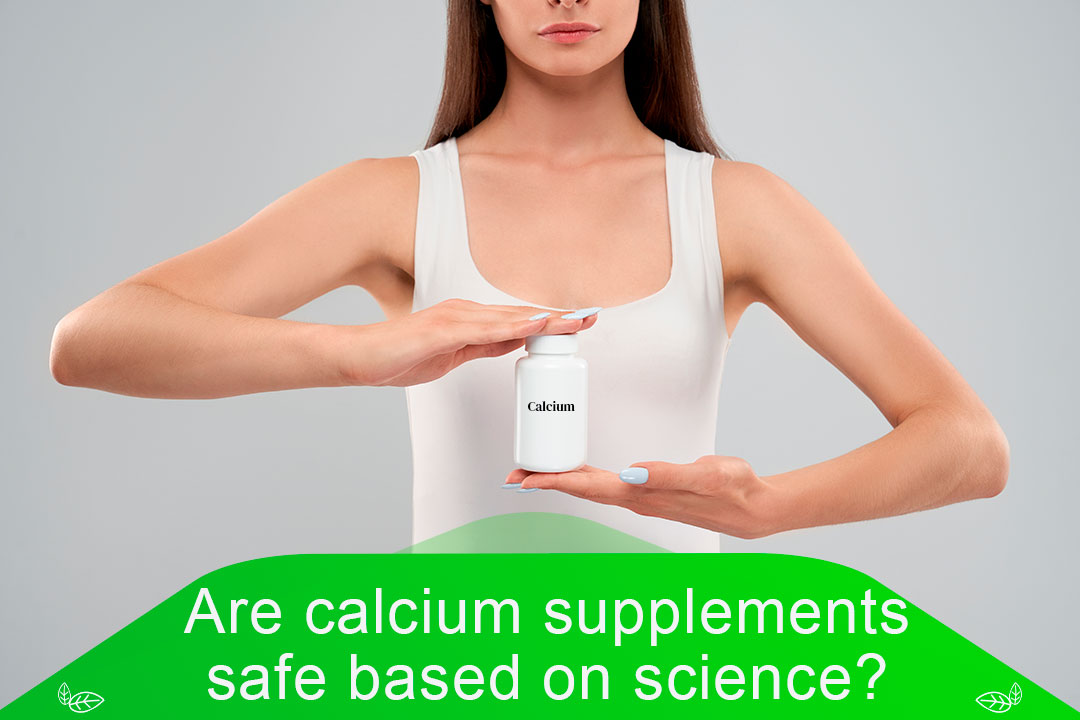Scientific research shows that our diet can have a significant impact on our health.
So, we need to eat the right foods and the right amounts so that our bodies could have all the necessary vitamins and minerals to function properly.
However, it’s not always as easy as it sounds. For example, ~ 3 cups of milk contain the recommended daily dose of calcium.
But do you drink 3 cups of milk every day? Probably not.
So, what’s the solution here? Supplements.
However, are calcium supplements safe and healthy for us based on science? Read the post below to find out.
Calcium supplements and cardiovascular disease (CVD)
Meta-analysis of 13 randomized, double-blind, placebo-controlled trials showed that the use of calcium supplements was significantly associated with the increased risk of CVD and CHD by 15%, specifically in postmenopausal women. [1]
One meta-analysis of the British population says that compared to a dietary calcium intake below 770 mg/day, intakes between 771–926 mg/day and 1074–1254 mg/day may be protective against both all-cause and cardiovascular mortality. The study has also shown that, when compared to intakes below 770 mg/day, higher dietary calcium intakes below 1255 mg/day may be protective against incident stroke. [2]
One more meta-analysis says that calcium supplementation with or without vitamin D does not increase coronary heart disease or all-cause mortality risk in elderly women. [3]
However, another meta-analysis says that calcium supplements (without coadministered vitamin D) are associated with an increased risk of myocardial infarction. [4]
And one more meta-analysis shows that calcium supplements used with or without vitamin D modestly increase cardiovascular risk. [5]
Calcium supplements and fractures
Two meta-analyses of 33 and 25 randomised controlled trials showed that the use of calcium, vitamin D, or both was not associated with a lower risk of fractures in community-dwelling older adults. [6, 7]
A systematic review of 2 randomised controlled trials of dietary sources of calcium and 44 cohort studies of relations between dietary calcium, milk, or dairy intake and fracture outcomes says that dietary calcium intake is not associated with risk of fracture, and there is no evidence currently that increasing dietary calcium intake prevents fractures. [8]
This systematic review suggests that clinicians, advocacy organisations, and health policymakers should not recommend increasing calcium intake for fracture prevention, either with calcium supplements or through dietary sources. [8]
Calcium supplements and cancer
Meta-analysis of 12 studies says that total calcium intake increases total prostate cancer. In seven studies with doses <750 Mg / day, the relationship between calcium intake and localized prostate cancer was not significant with the RR of 1.06 (95% CI: 0.96-1.17) and also in one studies with a dose > 750 Mg / day, this relationship was not significant with RR of 1.07 (95% CI: 0.82-1.39). [9]
Summary
So, are calcium supplements safe based on scientific research? It looks like the majority of studies say that calcium supplements may not be safe and the best way to get calcium is naturally with our diet instead of calcium supplements.
P.S. If you want to get my top science-based recipes that can be cooked in less than 30 minutes each and find out how science-based nutrition can prevent the most common diseases, improve your overall health and help you live longer then you can click here to learn more.
If you don’t want to miss my other articles then click here to subscribe to my Telegram Channel or use the form below to subscribe to my email newsletter.
You can read some of my other latest articles as well:
- Is having 6 pack abs healthy based on science?
- Does listening to music help with stress based on science?
- Why go vegan and 5 easy steps how to go vegan for beginners
- Is soy healthy based on science or does soy cause cancer?
- 5 healthy vegan salad recipes (oil-free)
- Animal vs plant protein. Which protein is best for health and strength based on science?
- 4 easy vegan pie recipes (+1 bonus recipe)
- Vitamin B12 recommendations based on science
- What is a superset and should you do supersets based on science?
- Top 10 vegan burger recipes
- Can music improve athletic performance based on science?
- How many sets should I do to build muscle based on science?
- Science-based iodine recommendations
- Should you train to failure based on science?
- How much protein can your body absorb in one meal based on science?
- Top 10 motivational quotes
- Omega-3 fatty acids recommendations
- What is the best training frequency for building muscle based on science?
- Best plant-based protein foods
- Happy New Year 2023!
- Does meditation help with stress and aging based on science?
- Is salt healthy based on science?
- Foods to improve performance in sports
- Healthy foods that last for a long time without a fridge
- Science-based macronutrient recommendations for athletes
- Top 7 healthy nuts to eat based on science
- Vitamin D recommendations, dosage, its impact on health
- How to live longer by increasing telomere length
- Healthy beverages based on science
- Recipe: whole wheat no-yeast vegan pizza dough
- What is NEAT? How to lose weight with NEAT?
- Are calcium supplements safe based on science?
- Are nuts good for weight loss and health
- 4 simple steps how I gained 1.5 kg (3+ lbs) per week healthily and how you can too
- Top 5 foods to avoid for weight loss and health
- Is fasting safe for weight loss and health?
- Top 10 healthiest berries
- Does healthy mindset really help improve our results (science-based)?
- Are potatoes healthy for you based on science?
- Is HIIT better than cardio based on science?
- What’s the best free nutrition tracker?
- How to build good habits in 4 simple science-based steps
- What are the scientific benefits of exercise?
- Are eggs actually good for you based on science?
- How to lose weight in 4 easy steps (science-based)
- Is keto diet safe and effective way to lose weight?
- Cardiovascular disease risk factors and treatment
- Is coffee healthy or does it increase the risk of diseases?
- Is laughter the best medicine?
- Can diet prevent and treat diabetes?
- The best way to lose weight: diet, exercise or both?
- How to live 10+ years longer in 4 easy steps?
- Which diet is the healthiest: omnivorous, vegetarian, vegan?

